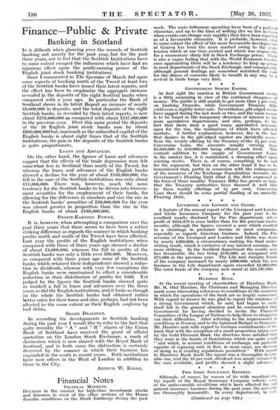Finance—Public & Private
Banking in Scotland
IT is IliffiCHlt when glancing over the records of Scottish banking not merely for the past year; but for the past three years, not to feel that the Scottish Institutions have to some extent escaped the influences which have had an injurious effect upon the profit-earning power of the English joint stock banking institutions. Since I commented in The Spectator of March 3rd upon some aspects of banking north- of the Tweed at least two of the Scottish banks have issued their latest reports, and the effect has been to emphasize the aggregate increase revealed in the deposits of the eight Scottish banks when. compared with a year ago. In particular the Bank of Scotland shows in its latest Report an increase of nearly £6,000,000 in deposits, and the total deposits of the eight- Scottish banks, as revealed, by, their _latest reports, is now. about 1276,000,000 as compared with about £247,000,000 in the previous year.' Over this same period the deposits of the 16 English • joint stock banks rose by about £240,000,000 but, inasmuch as the Subscribed capital of the English banks is about right times. that of the Scottish institutions, the gain in the deposits of the Scottish banks is quite proportionate.
LOANS AND ADVANCES.
On the other hand, the figures of loans and advances suggest that the effects of the trade' depression were felt somewhat less in Scotland than south of the Tweed, for whereas the loans and advances of the English banks showed a decline for the year of about 1142,000,000, the fall in the case of the Scottish institutions was only about £11,000,000. There was, however, much the same tendency for the Scottish banks to be driven into Govern- ment securities for the employment of their funds, for allowing for the differenee in numbers and size the rise in the Scottish banks' securities of £33,000,000 for the year was almost greater in proportion than the rise in the English -banks of about L183,000,1100,
PROFIT-EARNING POWER.
It is, however, when attempting a comparison over the past three years that-there seems to have been a rather striking difference as regards the manner in which banking profits north and south of the Tweed have been affected. Last year the profits of the English . institutions when compared with those of three years ago showed a decline Of about £4,000,000, whereas the fall in profits of the Scottish bank§ was only a little over.£60,000._ Moreover, as compared with three years ago none of the Scottish banks which retained their independence shOwed a reduc- tion in dividends, whereas with very few exceptions the English banks were constrained to effect a considerable reduction in their distribution of profits for 1982. Yet judged by. the figures the Scottish banks showed _quite as marked a fall in 'loans and advances over the three years as did the English institutions, and it looks as though on the whole the Scottish banks had obtained rather better rates for their loans and also, perhaps, had not been affected to the same extent as their English confreres by bad debts.
SHARE DEALINGS.
In recording the developments in Scottish banking during the past year I would like to refer to the fact:that quite recently the " A " and " B " shares of the Union Bank of Scotland have received the• grant of official quotation on the London Stock Exchange, a mark of distinction which is now shared with the Royal Bank of Scotland, and in both cases the distinction • is certainly deserved by the manner in which their business has expanded in the south in recent years. Both institutions have now offices in the West of -London in addition to
ARTHUR W. KIDDY.
















































 Previous page
Previous page